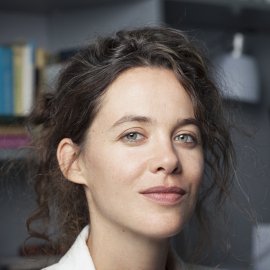Anthropology,Paris 8 University and École nationale supérieure de création industrielle (ENSCI), France

Octobre 2016 à Juin 2017
Anne Dubos is an anthropologist and a transmedia artist. She conducts a double research project between social anthropology and performing arts. In 2013, she obtained a PhD from Ecole des Hautes Etudes en Sciences Sociales (EHESS) on the gesture transmission in contemporary theater in Kerala (South India). After Marcel Mauss (1963), Adam Kendon (1997), and Marcel Jousse (1974), the objective of her research is to question how gesture can be defined and transmitted.
Both as a visual artist and a researcher she writes and directs performances and art installations in search for new theoretical paradigms. Between theory and practice, her aim is to understand creation process. From the morphogenetic analysis of a gesture in performance (that is, either on stage or in a rehearsal context) to a global understanding of body culture movement, her work aims to show that gesture could be perceived as a form that follows the transformation theory (D’Arcy Thompson: 1917). She therefore works at developing a “morphogenetic theatre theory”, where motion capture helps to show the modification of the shape of the body in time and space. Moreover, based on the assertion that there is an “ecology of practice” of the gesture (Bateson: 1983), her work includes the notion of “drama-diversity”. As such, she argues that there are necessary factors that allow the growth of a form and, consequently, she tends to generate maps of body movement. She has founded a multidisciplinary group : the Little Heart Movement, composed by dancers, theatre artists, martial artists, geographers, digital artists and software engineers, biomecanicians, anthropologists, philosophers, psychologists. They help her capture body movement and map it in 3 or 4 dimensions. Her research aims at revealing new theories of gesture transmission.
Phantom of the graphic form; towards an archeology of gesture
The study of Indian theatre history highlights the variety in the actor's body techniques. Based on the analysis of concrete cases of performance, Anne Dubos’ research project aims to measure the transformation of gesture through time and space. To challenge both epistemological and technological advancement, she plans to design several trans-media installations that will combine traditional performance and digital arts. The ultimate goal of the project is to design interactive tools where knowledge is closely associated to body performance. As a direct consequence, the archive of technical gesture will question heritage conservation policies. Beyond the design of a graphical analysis method, her research will aim at creating new archiving tools for social sciences.
DUBOS Anne et JÉGO Jean-François, "Rock Art Rocks Me",MOCO '16 Proceedings of the 3rd International Symposium on Movement and Computing,Thessaloniki, GA, Greece — July 05 - 06, 2016, ACM New York, NY, USA.
DUBOS A.,« de la Gestothèque au Port Nord – études pour ambiances patrimoniales industrielles à venir »,Nicolas Rémy (dir.) ; Nicolas Tixier (dir.). Ambiances, tomorrow. University of Thessaly, vol. 2, p. 891 - 896, 2016.
DUBOS A. (2013), « Chandradasan ou la pratique d’un théâtre de l’alternative. Quels enjeux sont liés à la reconnaissance des arts vivants contemporains au Kerala (Inde du Sud) ? » http://revues.mshparisnord.org/cultureskairos/index.php?id=720 in Culture Kairos, Revue d’anthropologie des pratiques corporelles et des arts vivants, Paris, MSH
Entretiens
DUBOS A. (2015), « Présences et déplacements. Le ciel d’Andrea — entretien avec Natacha Nisic », à propos de son exposition à la Galerie du Jeu de Paume, novembre 2013, Théorèmes, enjeux des approches empiriques des religions, Université de Genève (à paraître)
DUBOS A. (2013), « Le voile du croire, entretien avec Albert Piette », http://theoremes.revues.org/500 in Théorèmes, enjeux des approches empiriques des religions, Université de Genève